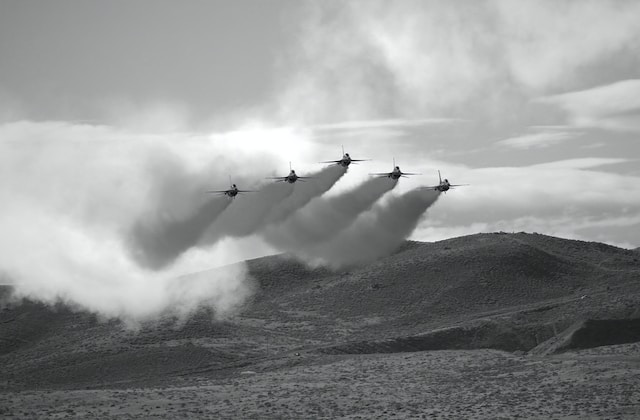Growing up near the United States Air Force Academy, I anticipated USAFA graduations. In 1963, President JFK spoke. Later, his motorcade passed close to our home. I waved at our well-tanned, youthful President in his Lincoln Continental convertible with the top down.
In contrast, annually the Thunderbirds came to salute the grads! I always thrilled to see Thunderbirds performing precise aerial maneuvers demonstrating the exhilarating capabilities of Air Force pilots and their high-performance aircraft.
And the sound! – especially while the crowd intently watched the diamond formation, the lead solo plane came blistering in very low and fast – from behind the crowd! Everyone jumped!
Piercing sounds from the Thunderbirds descended from heaven to earth.
But the Bible tells us that the ringing cries of people may pierce heaven too.
Here we focus on the story of Judah’s King Jehoshaphat when he learns three large armies had amassed 50 miles away to attack Jerusalem!
King Jehoshaphat and the people gathered in the LORD’s house. Leading in prayer, Jehoshaphat exalted God as the One who “rules over all the nations. None is able to withstand the LORD.” Now, the descendants of “Abraham, the LORD’s friend”(!), “were ‘crying out’ (‘zaaq’) to God in their affliction. ‘LORD, hear and save!’” (2 Chron 20:5-9)
Note, these people “cried out” to the LORD. Our word ranges from “calling together an assembly” to “shrieking from anguish or danger.” Here they shrieked!
Certainly, at times God advises: “Be still and know that I am God.” (Ps 46:10). And, “The LORD is in his holy temple: let all the earth keep silence before him.” (Habakkuk 2:20) Undoubtably, God is capable of hearing our whispers, groans and sighs. Even Jesus sighed. (Mark 7:34)
But, in this crisis, Jehoshaphat “cried out.”
Generations previously, the LORD instructed the Israelites to bypass the lands of the people who now hunted them down. Jehoshaphat bellowed: “O our God, will you not execute judgment on them? For we are powerless against this great horde that is coming against us. We do not know what to do, but our eyes are on you.” (2 Chronicles 20:12)
As Jehoshaphat “cried out” to heaven, what a poignant scene: “All Judah stood before the LORD, with their little ones, their wives, and their children.” (2 Chronicles 20:13)
Immediately, “the Spirit of the LORD came upon Jahaziel, a Levitical priest. He admonished and emboldened his neighbors: “Listen: Thus says the LORD to you, ‘Do not be afraid and do not be dismayed at this great horde, for the battle is not yours but God’s.’” (2 Chronicles 20:14,15)
“Then Jehoshaphat bowed his head with his face to the ground, and all Judah and the inhabitants of Jerusalem fell down before the LORD, worshiping the LORD. And the Levites, stood up to praise the LORD, the God of Israel, with a ‘very loud voice.’ (2 Chronicles 20:18,19)
How loud? They didn’t break the sound barrier. But, these very words describe the Egyptians ‘wailing’ at the death of their first-born sons. (Exodus 11:6) And after the Israelites marched around Jericho once a day for six days, on the seventh day on the seventh time around, all the people gave a ‘loud shout.’ It is said that Jericho had walls wide enough to drive chariots. But at this roar, Jericho’s mighty walls imploded! (Josh. 6:5)
Now, our story again. The next morning, King Jehoshaphat appointed a choir to lead his army. Preposterous! With a ringing cry they sang: “Give thanks to the LORD, for his steadfast love endures forever.” (2 Chronicles 20:21)
As the Israelite army marched, the choir “began to ‘sing’ and praise. The LORD set an ambush against Judah’s enemies so that they were routed.” Annihilated! (2 Chronicles 20:22)
What? A choir defeated a vast army? Yes, the LORD loved the way they trusted him. Their “singing” called him down from heaven. Here “sing” is no lullaby but, “rinnah” – “a ringing cry!”
An all-star cast uses this noisy, decibel-enlarging word. In the Psalms: David (3x), the sons of Korah (3x), and seven anonymous Psalmists.
The author of Psalm 126 uses our word three times. Upon the 1981 release of American hostages in Iran, President Reagan memorialized the event with Psalm 126: “When the LORD brought back the captives to Zion, we were like those who dreamed” (or “those restored to health”). “Our mouths were filled with laughter, our tongues with ‘songs of joy’…Those who sow with tears will reap with ‘songs of joy.’ Those who go out weeping, carrying seed to sow, will return with ‘songs of joy,’ carrying sheaves with them.”
Solomon uses our word to dedicate the Temple (2x) and once in Proverbs: “When the righteous prosper, the city rejoices; when the wicked perish, there are ‘shouts of joy.’” (11:10)
Still, Isaiah leads all authors, referring to such brassy jubilation nine times.
Note, Jeremiah’s three uses include God’s warning: “As for you, do not pray for this people, or lift up ‘a cry’ or prayer for them, and do not intercede with me, for I will not hear you.” (Jeremiah 7:16) Like ineffective primal scream therapy, so their hollow “ringing cry” simply added decibels to their unrepentant wickedness.
Nevertheless, for LORD’s redeemed, a thunderous sound louder than the Thunderbirds erupts from The Singer: “Fear not, O Zion; let not your hands grow weak. The LORD your God is in your midst, a mighty one who will save; he will rejoice over you with gladness; he will quiet you by his love; he will exult over you with ‘loud singing.’” (Zephaniah 3:16,17)
And God’s raucous heavenly jubilation provokes the counterpoint of “a great multitude that no one could number, from every nation, from all tribes and peoples and languages, standing before the throne and before the Lamb, clothed in white robes, with palm branches in their hands, and ‘crying out with a loud voice,’ ‘Salvation belongs to our God who sits on the throne, and to the Lamb!’” (Revelation 7:9,10)
Friend, let’s be among that boisterous crowd!



